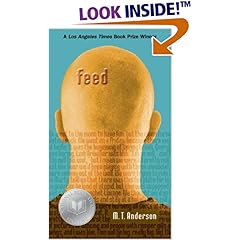 I’m not sure if I can write a coherent sentence after reading this book. The narrator of the story, Titus, speaks in slangy, disjointed English, reminiscent of the dumbest of high school wasters. In fact, he is a high school halfwit, enslaved to the feed that is implanted in his brain and controlled by the Big Corporations who feed advertising into his thoughts all day and even in his dreams.
I’m not sure if I can write a coherent sentence after reading this book. The narrator of the story, Titus, speaks in slangy, disjointed English, reminiscent of the dumbest of high school wasters. In fact, he is a high school halfwit, enslaved to the feed that is implanted in his brain and controlled by the Big Corporations who feed advertising into his thoughts all day and even in his dreams.
Titus meets Violet on a spring break trip to the moon. The two of them hook up, even though Violet is bit different. She’s been homeschooled, her parents didn’t have a feed, and she didn’t get hers until late —when she was seven years old. I thought this book was quite insightful, and my ten year old Karate Kid can testify, to his dismay, that I am now scared to let him play on the game cube because I’m afraid it’s taking over his brain.
I gave the book to Computer Guru Son (age 19), thinking he would like it. However, he said the narrator was annoying, and the premise of a feed into people’s brains reminded him of another book he had just read a few weeks before. So much for mother/son bonding over books.
The language in the book is not only slangy, but also rather rough. If f-word and s-word used indiscriminately and frequently will bother you, don’t read. However, if you want a look at a dystopia in which the media has become the message, literally, Feed is the book for you. It’s scary, and the ending is not happy.
I think the book would make a great movie, sort of like one of my favorites, The Truman Show, and that’s scary, too.
Interesting. I can’t say its one I would enjoy reading but definitely one I would want to know about. It sounds sort of like it would be a good high school companion to Amusing Ourselves to Death or something along the same lines.
Thanks for the review!
This sounds fascinating. It sounds like a modern-day fable that would make a more powerful impact on my kids than ten of my mini-sermons….
Jeanne
This brilliantly ironic satire is set in a future world where television and computers are connected directly into people’s brains when they are babies. The result is a chillingly recognizable consumer society where empty-headed kids are driven by fashion and shopping and the avid pursuit of silly entertainment–even on trips to Mars and the moon–and by constant customized murmurs in their brains of encouragement to buy, buy, buy.
Anderson gives us this world through the voice of a boy who, like everyone around him, is almost completely inarticulate, whose vocabulary, in a dead-on parody of the worst teenspeak, depends heavily on three words: “like,” “thing,” and the second most common English obscenity. He’s even made this vapid kid a bit sympathetic, as a product of his society who dimly knows something is missing in his head. The details are bitterly funny–the idiotic but wildly popular sitcom called “Oh? Wow! Thing!”, the girls who have to retire to the ladies room a couple of times an evening because hairstyles have changed, the hideous lesions on everyone that are not only accepted, but turned into a fashion statement. And the ultimate awfulness is that when we finally meet the boy’s parents, they are just as inarticulate and empty-headed as he is, and their solution to their son’s problem is to buy him an expensive car.
Although there is a danger that at first teens may see the idea of brain-computers as cool, ultimately they will recognize this as a fascinating novel that says something important about their world.
THIS BOOK IS A-M-A-Z-I-N-G!!!